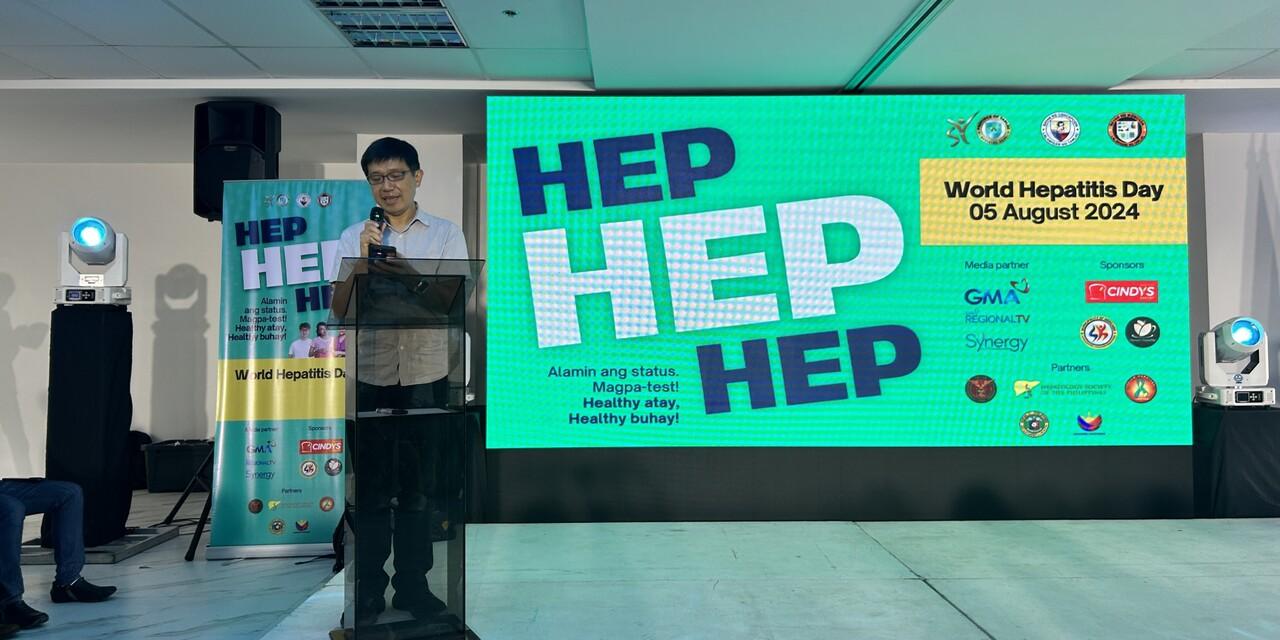World Hepatitis Day 2024: Vaccination and testing a must for all Filipinos

The World Health Organization (WHO) considers viral hepatitis as one of the major public health challenges of the decade.
Hepatitis is an inflammation of the liver caused by the hepatitis virus and non-infectious agents like alcohol intake, drugs, and other conditions that lead to various health issues.
According to the WHO's Global Hepatitis Report 2024, over 3,500 people die from hepatitis B and C each day, while 6,000 people are newly infected with viral hepatitis every single day.
The latest data from the WHO shows that over 300 million people in the world have viral hepatitis; 254 million of this population are living with hepatitis B, while 50 million have hepatitis C.
Ten countries — the Philippines, China, India, Indonesia, Nigeria, Pakistan, Ethiopia, Bangladesh, Vietnam, and the Russian Federation — comprise 80% or almost two-thirds of the global disease burden of hepatitis B and C.
In the Philippines alone, 5.7 million Filiipinos are living with hepatitis B, while 400,000 are living with hepatitis C, as of 2022.
While there are more improved tools and information today to prevent, diagnose, and treat or manage viral hepatitis, the WHO acknowledged that many people the world over still remain undiagnosed. Of those diagnosed with hepatitis, very little also receive the proper treatment.

Need a wellness break? Sign up for The Boost!
Stay up-to-date with the latest health and wellness reads.
Please enter a valid email address
Your email is safe with us
With the goal of eliminating viral hepatitis by 2030, the WHO set the theme of World Hepatitis Day 2024 to "It's time for action."
World Hepatitis Day, observed every year on July 28, aims to raise awareness of viral hepatitis and the importance of vaccination and diagnostic testing. It is also a celebration of the life and work of Dr. Baruch Blumberg, the Nobel Prize-winning scientist who discovered hepatitis B.
'Hep hep hep: Alamin ang status. Magpa-test! Healthy atay, Healthy buhay!'
Recently, a community screening and lay forum event on viral hepatitis was held at the Tarlac Provincial Hospital in Tarlac City in observance of World Hepatitis Day 2024.
The "Hep hep hep: Alamin ang status. Magpa-test! Healthy atay, Healthy buhay!" activity this past Monday, Aug. 5, was organized by the University of the Philippines Manila’s National Institutes of Health, the Strengthening the Integrated Care and Treatment of Hepatitis (StITCH) project, and the Tarlac Provincial Government.
More than 400 barangay health care workers and barangay nutrition scholars in Tarlac participated in the lay forum that tackled the importance of hepatitis awareness, hepatitis prevention, and its treatment and management. The attendees also underwent free testing for hepatitis B and C at the event.
In an interview with GMA News Online, Dr. Janus Ong, the project leader of StiTCH in the Philippines and a gastroenterologist and hepatologist, shared that the recent event in Tarlac had a good turnout and served as an opportunity to share their expertise about hepatitis to their partners on the ground and to raise awareness about StITCH's ongoing project in the province.
The StITCH project in the Philippines and Vietnam is a collaboration with the support of Gilead Sciences. It is being implemented by UP Manila, Harvard Medical School, Brigham and Women's Hospital, Beth Israel Deaconess Medical Center, and the Partnership for Health Advancement in Vietnam.
The four-year cross-country project aims to strengthen hepatitis diagnosis, care, and treatment in the Philippines and Vietnam through the creation and design of a community-based, people-centered primary care model. Currently, the project is being implemented in two municipalities in Tarlac, namely Concepcion and Moncada.
According to Ong, the yearly celebration of World Hepatitis Day is marked by free screenings as a way to illustrate to the public the need to get tested for both hepatitis B and C.
"There remains to be some lack of awareness, as well as understanding [of hepatitis], and so these outreach activities and lay fora are quite useful to raise awareness," said Ong.
"We know that everywhere else in the world, the diagnosis of both hepatitis B and hepatitis C has been lacking, so very few persons with hepatitis B or C have actually been diagnosed and that's not unique to the Philippines," he added.
Ong underscored the importance of hepatitis diagnostic testing, primarily because many of those infected with hepatitis rarely show symptoms. This is why hepatitis has also been called a "silent epidemic."
"When they develop symptoms it's usually late in the disease. Either they have cirrhosis and liver failure or they have developed liver cancer, two of the main complications that we really do not want to see in patients with hepatitis B or C," he said.
There are five main strains of the hepatitis virus — hepatitis A, B, C, D, and E — but Ong said they mainly focus on hepatitis B and C because these account for most of the cirrhosis, liver failure, and liver cancer-related deaths around the world and in the Philippines.
Prevention and risk factors
Hepatitis B has no cure, but it can be treated and controlled with the proper medication, so those who have it can live healthy and fruitful lives. Hepatitis B can also be simply prevented through vaccination, per Ong.
Meanwhile, there is no vaccine for hepatitis C, although it is curable in about 12 weeks upon the intake of medication, he added.
Both hepatitis B and C can be transmitted by blood or body fluids, through blood transfusion, sharing of infected needles, or sexual contact.
He highlighted the importance of being aware of one's vaccination status. Infants, for example, must receive their hepatitis B vaccine within 12 to 24 hours of birth. For children who were not vaccinated as infants, Ong said they can have their catch-up vaccination once they reach school age.
Adults who did not get their hepatitis B vaccine can get their jab, still, and also have their antibodies status checked to see if they are immune to hepatitis and if they have not been infected by it.
Ong also advised the public to avoid high risk behaviors to protect themselves from being infected with hepatitis. These include sharing of needles, multiple sexual partners, and unprotected sex. There is also risk in tattooing and piercings, so he cautioned against fly-by-night tattoo parlors and to only go to reputable places for such services.
Separating myths from facts
Amid all the information about hepatitis available online and offline, it can be tricky to separate the wheat from the chaff, misinformation from fact. These include misconceptions about hepatitis, such as hepatitis being transmitted through kissing or the saliva, skin-to-skin contact, and hugging.
Since hepatitis B and C are transmitted through blood and body fluids, it is a myth that one can be infected through hugging or skin-to-skin contact.
"Wala pong transmission na mangyayari [sa skin-to-skin contact], so kailangan malaking sugat, sobrang madugo at nagcocontact ‘yung dalawang sugat ng dalawang tao, pero if they don't see these wounds that are bloody, with exchange of blood, unlikely," he said.
"Saliva, as a body fluid, has very little hepatitis B, so it is not transmitted through saliva, kissing is not a risk for transmission," he added.
Herbal supplements should also not be used as a remedy to treat hepatitis as these are not regulated by the Food and Drug Administration. It is unclear, either, whether these supplements contain the active ingredients that they claim to have and if these are in the right dosage.
"Clearly, none of the supplements have been shown to get rid of the virus, so they're not treatments to get rid of the virus. To get rid of hepatitis B or to control hepatitis B, we really need the antiviral drugs that have been researched and developed to bring down the virus levels in the body,” said Ong.
On the social stigma of hepatitis
Having a lifelong condition like chronic hepatitis B does not mean one can no longer live a long and healthy life.
Ong confirmed that stigma and discrimination indeed exist against and among patients who have hepatitis B.
"They are always very worried about other people knowing about their infection or their having the infection, which is really unfortunate. Some health care workers who have worked with hepatitis patients have even said they really have very significant self stigma, meaning they ascribe the stigma by themselves," he said.
He also pointed out employment-based discrimination against people affected with hepatitis, especially among those who plan to work abroad.
"Our main problem has been those going overseas, especially the Middle East countries where it is always screened and majority are denied employment because of their hepatitis B or C status… Their hepatitis status has nothing to do with their employability and so I think that perpetuates this stigma and discrimination," he said.
For those with hepatitis B or C, Ong tells patients not to mind what they read about hepatitis being a "silent killer" as this could hurt more than help.
"What should be the outlook of patients with hepatitis B or C? We tell them if you are diagnosed and evaluated and cared for by people who know how to care for hepatitis, you can generally live a very long life. Follow up and follow the health care advice of your physician and your nurse on treatment," he said.
“If you are able to get tested, do get tested, especially for hepatitis B because that's encouraged for all Filipinos. If you're negative, then learn about how to avoid it, and that's really vaccination. If you're positive, then make sure you are seen by a doctor or a nurse, so that you can get the appropriate care."
—JCB, GMA Integrated News

Need a wellness break? Sign up for The Boost!
Stay up-to-date with the latest health and wellness reads.
Please enter a valid email address
Your email is safe with us










